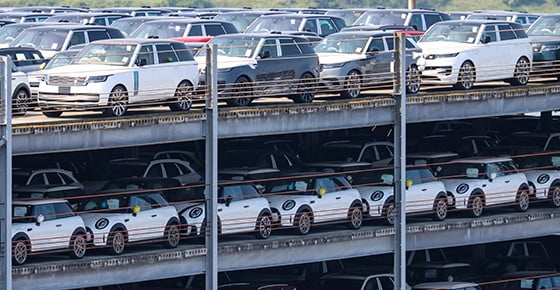
Another busy week for SMMT kicked off in Birmingham at the annual Commercial Vehicle Show, which opened its doors on Tuesday to thousands of visitors eager to see all the latest vehicles, trailers, equipment and technology, including the latest low and zero emission models.
Having had a difficult couple of years with the pandemic undermining many trade shows, it was great to see the place busy again, with stands full of visitors taking a close look at a great selection of the latest electric vans and other commercial vehicles and equipment. The Show provided an ideal platform to launch SMMT’s latest research, which showed that 57% of van owners are anxious about going electric, anxiety focused on fears they won’t be able to find a charging point when they need it.
Thanks to massive investment by the sector, the vehicles are ready, with more than a third of all new van models now available with a plug – many of which were at the CV Show – so there is increasingly an electric van to suit every business case. Yet, only one in 20 buyers has switched to a battery powered van so far this year and persuading more owners to do so is essential if the UK is to become Net Zero while keeping the nation and economy on the move.
The vast majority (88%) say they would go electric by 2035, but to accelerate uptake we need a ‘van plan’ to ensure zero-emission driving works for the millions of people for whom their van is their livelihood and the millions more who rely on these workhorses for the delivery of their daily needs.
Given 41% of respondents said they had nowhere to charge a vehicle at home or their depot, supporting both private and public chargepoint rollout will be essential. Charging provision must be factored into national infrastructure plans, with commensurate and binding targets for charge points suitable for commercial vehicles, not just passenger cars, to match the commitments made by the automotive industry. Manufacturers are getting these new technology vehicles into showrooms, but we urgently need government and other stakeholders to do more to get them out on the road in greater numbers.
Elsewhere this week, the latest SMMT automotive production data released showed the resilience of the CV manufacturing sector, which recorded the best performing April since 2016. Thanks to significant demand for British-built models and the pre-planned ramp up of production following Covid-related reductions last year, the market was up almost 28%, with 7,879 CVs rolling off factory lines in the month, 60% of which were destined for overseas markets.
Meanwhile, the number of new cars built in April fell by -11.3% to 60,554 units. Engine production also declined by -2.7%. Whilst this poor performance is unsurprising given the global supply chain shortages and slowing markets, it underscores the difficulties the industry is facing, difficulties exacerbated by competitive pressure at home with increasing energy prices, additional trading costs and inflationary pressures. There is no doubt that the UK automotive industry is resolute, with strong foundations, but much more needs to be done and at pace to enhance manufacturing competitiveness and encourage investment into the UK industry so that it can meet these myriad challenges.


